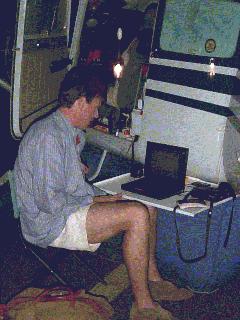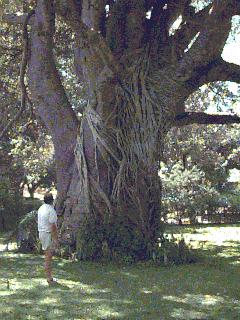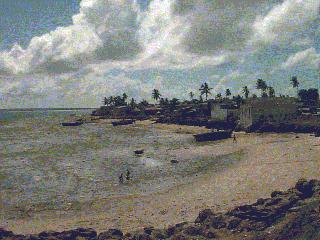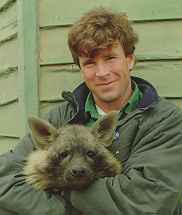Flights of Tom Claytor:
The
Journals of a Bush Pilot
Travelling Though
Africa
![]()
Tom Claytor is currently flying a C180 solo around
the world.
![]()
It is a little frustrating trying to get flight clearances. One country
speaks English, the next one Portuguese, another one French, and none of
them answer me. My eyes hurt; my neck and my joints hurt too. All I want
to do is lie down, and now I have a fever. Somehow, this does not surprise
me, and I am waiting for the shivering to start. Malaria is like the flu
in this part of the world - except that it can kill you. I have a box in
the back of the plane filled with all sorts of pills. The malaria here is
chloroquine-resistant, so it is best to use Halfan. I can feel my strength
being sapped away. I don't want to eat. I didn't even want to go to the
plane to get the pills. The danger is that if you don't start the
treatment soon enough, you won't be able to keep the pills down. Finding
hospitals and quinine injections is sometimes a little like playing
Russian roulette in this part of the world.
The problem with malaria is that as you get weaker your ability to
reason and think logically also becomes less and less. Two days later, I
have decided that I must have tick-bite fever, so I begin a course of
tetracycline. I also go to the hospital, which is not nearby. There are
over 100 Africans waiting to see someone. I find a small screened building
and greet a pleasant man sitting behind a microscope. "We are lacking
reagents," he tells me. I am still strong enough to smile and joke
with him, and I am grateful for this. He locates some spare reagents, and
I watch him remove some blood from me and dry it on a slide. The dye
should turn the parasites inside the red blood cells a bright purple
color, but we can't find any. "If you have already taken the
medicine, it is probably due to that," he says. We can't find any
spare reagents to look for tick fever. I find the young South African
doctor. He is not coping very well with this hospital. He appears nervous
and unsure like someone is about to yell at him. I show him a graph of my
temperature over the past days and explain which drugs I have taken. He
tells me that they don't have Halfan in the country and that I have done
all that I can, then he charges me 75 Kwacha.
I walk along the runway of this place. There is a beautiful old
Portuguese colonial building with pointed arches, tiled walls and wooden
glass plate doors. A delicate Muslim man calculates and collects the
landing fees. There are other buildings; they look like ghosts floating in
fields of tall golden green grass. Strangely, I cannot find a path through
the grass. I want to cross and photograph one of these houses, or to find
the road that leads to town. Something is a wrong, I feel. There are 40
million land mines in this country. The war stopped in 1992. It started to
feel safe in 1994, but who is going to remove the 40 million land mines.
These are not my figures, but those of HALO - a trust set up to diffuse
the mines. I was warned that if I needed to relieve myself along one of
the roads, that I should not venture into the bush, but "piss on the
road." Perhaps, this is why there are no paths in the tall grass. If
the people here must pass through an area that they are unsure of, they
herd their cattle before them. It is an expensive way to clear mines, but
what else can they do.
As I drift across the landscape of this foreign place, I rest my
forehead against the window and stare down at the ground below. There is
so little trace of man down there. There are no roads; there are no
railways. These are the problem. For with them, come the man and his
technology which seems to sweep like a fire in the wind across the face of
the earth. I find it so soothing to look down on nothing. With time, I am
in clouds again. I am silently wondering if I should continue on to the
coast; I would like to. A faint call then comes across the radio with an
unusual accent. He is calling me. I haven't announced myself in this
country, so I am surprised that my flight plan has for once alerted
someone to my approach. They want to know my ETA for Nampula, so I decide
that the coast will have to wait for a few more hours while I descend down
into the world of people and formalities. I look at the map for the
altitude of the surrounding terrain. I turn on my radar altimeter to help
search the ground. My permission to descend has been granted. It is like
walking towards a wall with your eyes closed. You count the steps, and you
hope that you have been given the correct number before reaching the wall.
The radar altimeter is a friend - like a voice on your shoulder - in case
someone, by chance, has told you the wrong number of steps. The clouds
become dark; you are moving so fast, yet you are not moving at all. It is
nice to be thinking clearly and so far ahead. The little drops of water
from the clouds form dots and streams across the screen. It keeps
reminding me of a horse; you put in little commands, and she responds. It
is so much like opening your eyes again once you emerge from this world of
cloud. The ground appears, and you are almost startled by it. I look
beneath this ceiling of milky white. There are giant "thumbs"
emerging up from the ground and all around. They are giant rock domes
scattered all over the place. Some are round on the top, some are a little
jagged, but between them all is flat even green earth. Now, where is this
place, I wonder. The unusual accent asks me to report when I have the
field in sight. I am having too much fun absorbing this bizarre and
different world, but I tell him, "roger."
I have been practicing my Portuguese for the past 4 weeks. I know the
's' is a "sh" - the 'm' is a "ng" - and the 'h' is a
"y." It seems to be a Spanish spoken with a French accent. I am
so grateful for having learned to speak Swahili some time ago. The secret
of a language seems to be in one's ability to say a few phrases snappily
and correctly. When you receive a reply with a smile, your confidence
mounts, then you just ask to be taught the next phrase. There are good
people here and there are some not-so-good people. I already know this by
looking in their eyes. I am very suspicious of the Immigration guy; he
just has that uniform and that devouring look about him. I greet him
first. I ask him where his house is. It is over in that direction, and he
is Arlindo George; I tell him that I speak Portuguese very well. Everyone
is chuckling at this, so he smiles a little bit. There are a lot of
"Cabinets" to visit here, so I begin. There is the Dispatch one
for stacionment, landing and navigation. Then there is a Customs one, then
there is the Cabinet for Immigration. Everyone keeps hurrying me along to
this particular Cabinet. I get the feeling that this is where the
"kill" occurs, and they are keen to get this done with before
lunch time. I am too engrossed in my various Portuguese lessons from
different individuals to be hurried along, and I can sense that this is
disrupting "the system." When I arrive at the Cabinet of
Immigration, I know enough Portuguese to engage my captor. Everyone else
has left the office, and we sit down. I decide it is better to attack
before any discussion of taxes begins. I ask him if they eat dogs here.
No, he assures me, they do not eat dogs here. "I am so happy to be
here; I want to come back many times," I tell him. "Will he be
here all these times in the future?" "Yes," he says, but he
wants to get on to the topic of taxes. I can see he is not quite sure how
much of a tax I should pay. He says I must pay $25. Perhaps, he is a
little surprised, but I tell him that, "no, I was told that the tax
was only $5." These are the moments of truth as we are sizing each
other up. He says $10, and now I know which game we are playing. No, I am
sure they said it was $5, but the next time I see you, maybe it can be
more. "When is that," he wants to know. "No, just in the
future," I assure him. He accepts the $5, but is a little confused,
because now I want a receipt.
I walk through the old fort. It seems to be in better condition than
most of the buildings in the town. There are intricate roof structures and
canals. The rain water is conducted through an elaborate network and
collected in cisterns. I descend down into one of the long dark tunnels. I
can hear noise at the end. The passage is narrow and dark. I come to an
opening the size of a squash court. There is a woman on a balcony above
this dark space lowering a bucket on a rope to the fresh water below. It
is an eerie and echoing place. The woman has a mask of opaque material on
her face; many Muslim women wear this like make-up. She looks at me then
continues with her work. I have encountered several young island boys
inside of the fort. Instead of risking being jumped by them, I pause and
ask them to show me around. I look into their little eyes. They have seen
so much more than I have. I have never lived through a war.
I think back on Andrea's strangler fig. "Wars are about a standard
of Life," Andrea tells me. "Tribalism and religion - these are
just an excuse. It is always between those with too much and those with
too little," he says. "The richer you are, the higher the value
of life; the poorer you are, the less the value of life. The poor have
nothing to lose." Andrea speaks with force. He thinks the CIA is
behind most things, but he does have some very interesting perspectives.
He tells me about the Crusaders. "They were son's of Aristocrats, not
the eldest. They had nothing to lose. Through war, they could gain glory,
decoration and wealth. History never changes. These are the same
situations, but we don't recognize them. The decadent are taken over by
those with nothing. Religion and tribalism are the catalyst."
 19
May 1996 - Lumbo, Mozambique
19
May 1996 - Lumbo, Mozambique
 A
woman from home, who I care for, writes to tell me that she knows
"someone" who had malaria, and that I should be careful. I am
not quite sure whether she thinks I am stupid or whether she is trying to
hurt me. Perhaps, she is not aware that not many people in America get
malaria, and that this "someone" is obviously the pretty little
Dutch-African boyfriend that she met when she was out visiting me. I may
be in a delirious state, but I am intrigued by this.
A
woman from home, who I care for, writes to tell me that she knows
"someone" who had malaria, and that I should be careful. I am
not quite sure whether she thinks I am stupid or whether she is trying to
hurt me. Perhaps, she is not aware that not many people in America get
malaria, and that this "someone" is obviously the pretty little
Dutch-African boyfriend that she met when she was out visiting me. I may
be in a delirious state, but I am intrigued by this.
 It is dark, and it is late. I sit beneath the wing in "my
office" and reflect on this. Fortunately, I am sick in a friendly
place under the care of a very kind Italian family. One of the sons,
Andrea, tells me the Chewa legend of "Kachere" - the fig tree.
"It is a battle of good and evil," he says. The strangler fig is
a tree which gives a lot of shade; it is a meeting place for young and
elderly people, so it is good. The small tree that it grows on is evil,
because it is not a shade tree. It does not do good for the people.
"In the end, good will win over evil," Andrea tells me. The fig
strangles the smaller tree and provides shade for the people. I am trying
to grasp the logic of this. In a way, it reminds me of another tale of
Africa - of the scorpion and the crocodile. The scorpion approaches the
crocodile to ask for a ride across the river. "No, you will sting
me," the crocodile replies. "If I sting you, than I would also
die," says the scorpion. The crocodile allows the scorpion to crawl
onto his back. Midway across the river, the scorpion stings the crocodile.
Before they both drown, the crocodile asks the scorpion, "why?"
The scorpion answers,"this is Africa."
It is dark, and it is late. I sit beneath the wing in "my
office" and reflect on this. Fortunately, I am sick in a friendly
place under the care of a very kind Italian family. One of the sons,
Andrea, tells me the Chewa legend of "Kachere" - the fig tree.
"It is a battle of good and evil," he says. The strangler fig is
a tree which gives a lot of shade; it is a meeting place for young and
elderly people, so it is good. The small tree that it grows on is evil,
because it is not a shade tree. It does not do good for the people.
"In the end, good will win over evil," Andrea tells me. The fig
strangles the smaller tree and provides shade for the people. I am trying
to grasp the logic of this. In a way, it reminds me of another tale of
Africa - of the scorpion and the crocodile. The scorpion approaches the
crocodile to ask for a ride across the river. "No, you will sting
me," the crocodile replies. "If I sting you, than I would also
die," says the scorpion. The crocodile allows the scorpion to crawl
onto his back. Midway across the river, the scorpion stings the crocodile.
Before they both drown, the crocodile asks the scorpion, "why?"
The scorpion answers,"this is Africa."
 On the coast, I walk a long way down a long road. Pierre Jaunet, a
Frenchman in Zimbabwe, told me to come here. He landed his Catalina in the
bay. The road leads to an even longer causeway which reaches out across
the water to the Island of Mozambique. This was the Portuguese capitol
until 1894. It is long and skinny. On the far north end is a massive fort
shaped like a five-point star with sheer walls that drop down into the
ocean. The town is an incredible contrast of beautiful colonial buildings,
Portuguese statues, churches, mosques, and crumbling relics. I don't see
another white face. I meet a man who takes me up into one of the relics to
eat sugar cane with his wife and his children. His wife's sister is there
too. She is 17 and has those sleepy eyes and loose fitting top of someone
who oozes sex. Most of the building they live in does not have a roof.
This man wants to come with me around the world. "What about your
family," I ask. "I am not worried about them," he says. He
offers me his sister-in-law for $2. His wife looks like a survivor.
On the coast, I walk a long way down a long road. Pierre Jaunet, a
Frenchman in Zimbabwe, told me to come here. He landed his Catalina in the
bay. The road leads to an even longer causeway which reaches out across
the water to the Island of Mozambique. This was the Portuguese capitol
until 1894. It is long and skinny. On the far north end is a massive fort
shaped like a five-point star with sheer walls that drop down into the
ocean. The town is an incredible contrast of beautiful colonial buildings,
Portuguese statues, churches, mosques, and crumbling relics. I don't see
another white face. I meet a man who takes me up into one of the relics to
eat sugar cane with his wife and his children. His wife's sister is there
too. She is 17 and has those sleepy eyes and loose fitting top of someone
who oozes sex. Most of the building they live in does not have a roof.
This man wants to come with me around the world. "What about your
family," I ask. "I am not worried about them," he says. He
offers me his sister-in-law for $2. His wife looks like a survivor.
 I
lie in the moist heat and listen to mosquitoes buzz around my head. I
can't sleep. I am not worried, but I am thinking about the next place.
I
lie in the moist heat and listen to mosquitoes buzz around my head. I
can't sleep. I am not worried, but I am thinking about the next place.

Tom Claytor
![]()
Note from the Editor. Continue with Tom's latest reports by using the link found in the eBush Communications Page.
Use the attitude indicator as your guide back to Inside Africa.
Top of this story. 
Last modified on
March 05, 2006 .
© Virtual Horizons, 1996.